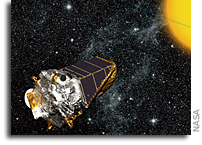NASA Kepler Mission Manager Update 1 Novermber 2011

Busy times are routine for the Kepler project team. Since my last update, we have announced several more confirmed planets — Kepler-16b, and the Kepler 18 system (18b, 18c, and 18d). We were particularly excited about Kepler-16b as it confirms that planets orbiting two stars — called circumbinary planets — do exist, and we see more emerging from our data. Working on the Kepler-16b announcement was especially unique, since we had a chance to collaborate with Lucasfilm’s Industrial Light and Magic for the press conference.
Flight segment operations with the spacecraft have remained nominal. Routine operations are good for our mission operations team, as we have completed science data collection for quarter 10 and rolled the spacecraft into its Fall season attitude. This was the second full quarter in a row with no significant anomalies or unplanned science breaks. We are well into Quarter 11 science data collection and completed the latest science data download from the spacecraft on Sunday, Oct. 30, 2011.
As the Kepler spacecraft continues to drift farther away from Earth (now close to 51 million kilometers), we continue to drop our data rate to maintain X-band communication for semi-weekly contacts. Around the September roll we dropped down to 250 bits-per-second (bps). For the next 6 months, the spacecraft will be closer to Earth again and get up to 2000bps but then it will start to drift away again. Next summer, around the roll contact, we’ll need one of NASA’s biggest antennas (70-meter diameter) in the Deep Space Network just to maintain that 250bps link.
Finally, the Kepler Science Team is hosting the First Kepler Science Conference at NASA Ames Research Center Dec. 5-9, 2011. We are expecting more than 300 attendees at the conference. More than 200 abstracts have been submitted for presentation at the conference. Topics range from Earth-analog and sub-Neptune-size planets to multiple-planet systems to asteroseismology. This will be an opportunity to showcase not only the investigations of the Kepler Science Team, but also those of the wider science community using publicly accessible data from Kepler.








